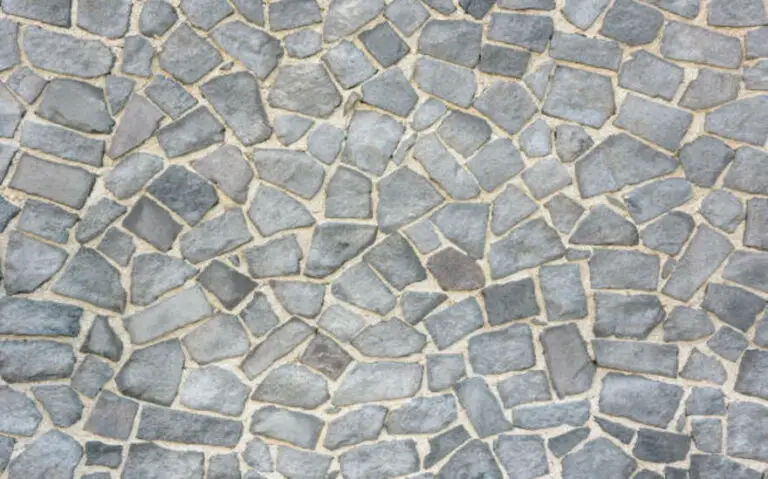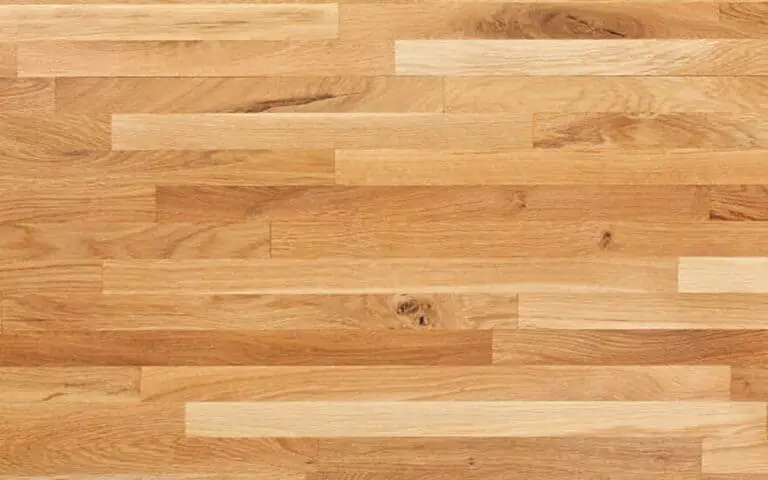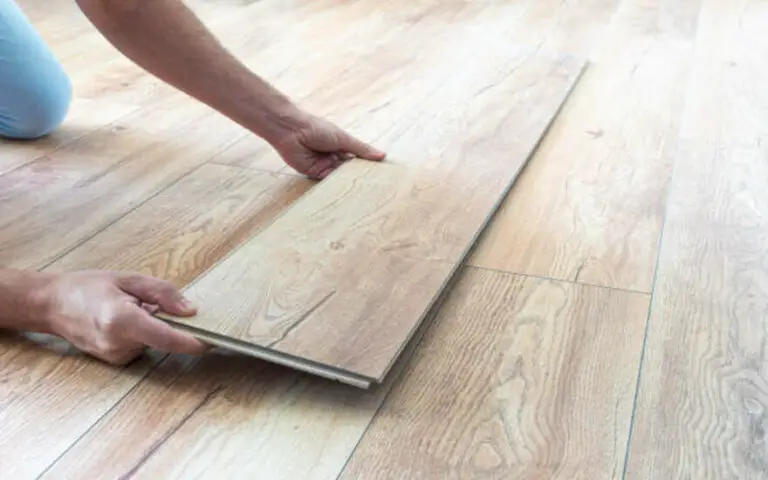Are you considering renovating your bathroom and looking for the best flooring option? In this blog post, I’ll explore the benefits of vinyl plank flooring and how it can be used in a bathroom.
What is Vinyl Plank Flooring?
Due to its great value, vinyl plank flooring is a popular option among homeowners. It is created using vinyl material to form planks or tiles that can be installed over an existing floor. This flooring is incredibly durable and waterproof, making it an excellent choice for bathrooms.
It is also available in various styles, colors, and designs, so you can easily find one that suits your tastes and bathroom decor. Vinyl plank flooring is also easy to install and maintain, making it a great option for any bathroom.

10 Benefits of Vinyl Plank Flooring in a Bathroom
Vinyl plank flooring offers many great benefits in a bathroom. It is water-resistant, comfortable underfoot, and relatively inexpensive compared to other flooring materials. There is a wide variety of styles and designs to choose from.
Vinyl plank flooring may be easily installed and can endure for many years in a bathroom. Additionally, vinyl is 100% waterproof and can easily be wiped clean with a damp cloth. Here is the benefit of vinyl plank flooring:
1. The durability of Vinyl Plank Flooring
Vinyl plank flooring is known for its superior durability. It is designed to withstand heavy foot traffic and everyday wear and tear. This makes it a great choice for families with children and pets in a bathroom, as it can withstand constant activity.
Furthermore, vinyl plank flooring will last for years without showing wear and tear. This makes it a great investment for any homeowner looking to save money in the long run.
2. Water-Resistant Properties
Vinyl plank flooring offers excellent water-resistant properties that make it ideal for bathroom use. The material is designed to be completely waterproof as standard, making it a great choice for areas of the home that may be exposed to water. Vinyl Plank Flooring also can wick away moisture, making it a safe option for any bathroom where water may be spilled.
Because of this, it’s a fantastic option for folks who need assurance that their flooring will be secure and dry at all times.
3. Easy to Clean and Maintain
Cleanliness is a top priority for many homeowners, and vinyl plank flooring makes it easy to keep your bathroom looking sparkling. This flooring is resistant to dirt, dust, and other contaminants, meaning it can be quickly wiped down and cleaned with just a mop and some mild soap.
It also resists stains and discoloration, so it won’t lose its good looks with time. Furthermore, vinyl plank flooring is resistant to mold, mildew, and other water damage, making it ideal for humid bathrooms.
4. Variety of Styles to Choose From
Vinyl plank flooring can be found in many styles, allowing you to find the perfect look for your bathroom. From modern and sleek to rustic and traditional, there is something for everyone. You can also choose from various colors, textures, and patterns to further customize the look of your bathroom.
With so many options, you can easily create the space you’ve been dreaming of. Plus, since vinyl plank flooring is so durable, you can rest assured that your bathroom will maintain its beautiful look for years to come.
5. Noise Reduction
Noise Reduction is one of the many benefits of vinyl plank flooring in a bathroom. Vinyl planks are designed to absorb sound, making them perfect for busy households. They’re also great in homes with small children, as they can help to dampen the sound of running feet and loud laughter.
Additionally, vinyl planks offer a softer surface than other flooring materials, making them perfect for bare feet.
6. Slip Resistance
Slip resistance is essential for any bathroom flooring, and vinyl plank flooring is an ideal choice. Vinyl flooring has a textured surface that provides excellent grip, making it suitable for areas with a lot of moisture. This ensures that your bathroom is safe and prevents any slips or falls.
Additionally, vinyl planks are often thicker than other flooring options, which gives them added cushioning and comfort underfoot. This makes them great for frequently used bathrooms, providing a comfortable and safe surface for everyone.
7. Cost-Effective Solution
Vinyl plank flooring is an excellent cost-effective solution for your bathroom flooring needs. It is much more affordable than other types of flooring, such as hardwood or stone, and can be installed quickly. Additionally, it requires very little maintenance, making it an even more cost-effective option.
Vinyl plank flooring is also incredibly durable, meaning You can put off replacing it for a while. This makes vinyl plank flooring an ideal choice for those looking for a cost-effective solution for their bathroom flooring needs.
8. Easy Installation Process
Vinyl plank flooring has never been simpler to install in a bathroom. Vinyl plank flooring offers a simple, no-hassle installation process. You can install it straight over an existing floor surface, or if you’re starting from scratch, it’s a relatively straightforward process.
Depending on the complexity of the room and the material chosen, the installation can take a few hours to up to a full day. Vinyl plank flooring is also DIY-friendly, so if you’re looking to save money and have the skills, you can take on the project yourself.
9. Long-Term Value
The durability of vinyl plank flooring makes it a smart investment for wet areas like bathrooms. Unlike other flooring options, it is incredibly durable and can last for decades if properly cared for. This makes it an excellent investment for any homeowner looking to increase the value of their home.
Additionally, vinyl plank flooring is very low-maintenance, requiring only occasional cleaning and resealing. This saves time and money in the long run as it does not require frequent repairs or replacing. All these factors together make vinyl plank flooring an easy choice for anyone looking for long-term value in their bathroom.
10. Added Comfort and Warmth
Vinyl plank flooring provides a layer of comfort and warmth to your bathroom. Its insulating properties can help reduce energy costs and maintain a comfortable temperature in your bathroom all year. Vinyl plank flooring is also resistant to moisture and can help reduce the amount of dampness or condensation in your bathroom.
Therefore, it is a great option for use in humid conditions when a bathroom has to be air-conditioned. Plus, its anti-static properties help minimize dust and dirt buildup, keeping your bathroom looking sparkling clean.
5 Pros of Different Types of Vinyl Plank Flooring
Vinyl plank flooring is becoming increasingly popular among homeowners due to its many benefits. From waterproofing to its realistic visuals and low-maintenance needs, there are many reasons why homeowners choose vinyl plank flooring. Here are five of the top pros of different types of vinyl plank flooring that make it such a great choice for many homeowners:
1. Waterproof Vinyl Plank Flooring
Waterproof vinyl plank flooring is ideal for kitchens, bathrooms, and basements. This is because it is completely waterproof, making it a perfect choice for areas prone to moisture.
Not only is it waterproof, but it is also incredibly durable and can last for many years. Plus, it is incredibly easy to clean and maintain and comes in various styles and designs.
2. Luxury Vinyl Plank Flooring
Regarding luxury vinyl plank flooring, you can rest assured that it will provide you with a stunning, high-end look that will turn heads. Not only is it incredibly durable, but it also offers realistic visuals and an array of finishes.
This type of flooring is perfect for those who want to make a statement in their home, as it is available in various styles, designs, and textures. Additionally, luxury vinyl plank flooring is low-maintenance and easy to clean, making it a perfect choice for busy households.
3. Rigid Core Luxury Vinyl Plank Flooring
Next up on our list of different types of vinyl plank flooring is a rigid core luxury. Rigid-core luxury vinyl plank flooring has become increasingly popular due to its durability and ease of installation. It also has several advantages compared to other types of vinyl plank flooring, such as its waterproof nature, scratch-resistant surface, easy maintenance, and a wide variety of finishes it can come in. All in all, rigid core luxury vinyl plank flooring is an excellent choice for strong, durable, and affordable flooring material.
4. Enhanced Vinyl Plank Flooring
The fourth type of vinyl plank flooring is Enhanced Vinyl Plank Flooring. It has a more natural look and feels, with a realistic wood grain finish on the surface.
Enhanced vinyl is more durable than regular vinyl, with improved Resistance to scratches and wear and tear. It’s also easier to clean and maintain, making it a great option for busy households. Finally, it comes in many colors and textures, matching any decor.
5. Stone Plastic Composite Vinyl Plank Flooring
The Stone Plastic Composite (SPC) type of vinyl plank flooring is the most versatile and durable. SPC vinyl planks provide excellent water resistance, making them perfect for kitchens, bathrooms, and basements. They are also extremely durable, scratch-resistant, and withstand heavy foot traffic.
And with various colors and textures, you’re sure to find one that fits your style. SPC vinyl planks are easy to clean and maintain, making them a great choice for busy households.
5 Cons of Different Types of Vinyl Plank Flooring
Vinyl planks are not as hard-wearing as hardwood or tile so that they may be prone to scuffs and scratches. Additionally, vinyl plank flooring is susceptible to water damage if it is not properly sealed. This can cause discoloration and warp over time.
Furthermore, vinyl planks installation can be tricky, as some types require glue or special tools. Lastly, the color and texture options for vinyl plank flooring are limited compared to other types of flooring. Additionally, some vinyl planks may emit volatile organic compounds, which can be hazardous to your health.
1. Lack of Resistance to scratch and wear
One of the drawbacks of vinyl plank flooring is its lack of Resistance to scratch and wear. While it is highly durable, it is still not as durable as hardwood flooring. Vinyl plank flooring tends to dent more easily and show more signs of wear and tear over time.
This can be particularly problematic if you have pets or kids running around the house. If you want a floor that can withstand heavy usage, you may consider a more durable material such as hardwood or laminate.
2. Susceptibility to water damage
Water damage is a major concern when it comes to vinyl plank flooring. Vinyl planks can be susceptible to water damage, which can cause warping, buckling, and other issues. Even if the planks are waterproof, it’s important to remember that vinyl planks are not impervious to water. If the planks get too wet, they will expand and contract. This can lead to warping and buckling of the planks.
Additionally, if water seeps in between the planks, it can cause mold and mildew problems. Keeping the vinyl planks dry and clean is important to avoid these issues. Regular mopping and wiping down of the planks with a soft cloth can help prevent water damage.
3. Difficulty in installation
One of the potential downsides of selecting vinyl plank flooring is the installation difficulty. Although most vinyl planks are designed to be installed with a click-together system, this isn’t always the case. Rigid vinyl plank flooring, in particular, requires a more complex installation process, as it must be glued down.
His can be a challenging process for DIYers, and they may need the help of a professional. It’s also important to note that some types of vinyl plank flooring require a specialized underlayment or padding, which may not be included in the product and must be purchased separately.
4. Limited color and texture options
While vinyl plank flooring can imitate the look of hardwood, the range of colors and textures available are limited compared to those of natural hardwood floors. This can be a problem if you have a particular style or look that you are trying to achieve in your home. Also, there aren’t as many colors and textures to choose from as there are with natural hardwood floors.
5. Off-gassing of volatile organic compounds
After thinking about all the good things about vinyl planks, it’s important to also think about the things that could go wrong. One of the most significant is the potential for off-gassing volatile organic compounds (VOCs). Vinyl planks produce VOCs due to the manufacturing and installation process, which can be hazardous to your health and the environment.
How to Repair Damaged Vinyl Plank Flooring?
When repairing damaged vinyl plank flooring in the bathroom, it is important to address the issue quickly. If the damage is minor, it can often be fixed with an adhesive repair kit. If the damage is more extensive, the affected planks may need to be replaced.
Regardless of the type of repair needed, it is important to thoroughly clean the area before attempting any repairs. This will ensure that the adhesive used to replace the planks will adhere properly. Additionally, cleaning and drying the affected areas before applying any glue is important to help prevent any future damage from moisture.
Maintenance and Care Tips for Vinyl Plank Flooring in the Bathroom
As vinyl plank flooring is a durable and waterproof option for bathroom floors, keeping it clean and in good condition is important. Regular cleaning and maintenance are necessary to ensure the flooring lasts for years. To do this, sweep or vacuum the floor regularly to remove dirt and debris.
- Additionally, it is important to use a wet mop on the floor to remove any stubborn residue and prevent dirt buildup. When mopping, use a mild detergent and warm water. If spills occur, quickly wipe them up to prevent staining.
- When it comes to vinyl plank flooring alternatives for the bathroom, there are several options available. Ceramic tile is a popular choice for bathrooms as it is waterproof, durable, and easy to clean. Natural stone is also an option, although it is more expensive and requires more maintenance.
Laminate flooring is a great option as it is water-resistant and comes in various colors and patterns. Finally, cork flooring is a great choice for bathrooms as it is waterproof and anti-microbial.
How to Choose the Right Type of Vinyl Plank Flooring?
When choosing the right type of vinyl plank flooring for your bathroom, it’s important to consider the style and color best suits your space. Vinyl plank flooring comes in various styles, colors, and textures, so there’s something to suit any taste. You’ll also want to consider the level of water resistance you need and the best installation method for your bathroom.
Also, ensure that the vinyl plank flooring you choose will work with the underlayment or moisture barrier you want. With the right type of vinyl plank flooring, you can create a stylish and comfortable bathroom floor that will last for years.
What is the best waterproof vinyl flooring for a bathroom?
When finding the best waterproof vinyl flooring for your bathroom, you’ll want to look for one that offers superior durability and is highly resistant to water and moisture. Luxury Vinyl Plank (LVP) is a great choice for bathroom flooring as it is 100% waterproof, incredibly durable, and easy to install. LVP is a great option for bathrooms, as it can withstand moisture and is easy to clean.
What is the best flooring to put down in a bathroom?
When choosing the best flooring for a bathroom, several options are available. But one of the most popular choices is vinyl plank flooring. Not only is it waterproof, making it ideal for high-moisture areas, but it is also durable and easy to clean.
Vinyl plank flooring comes in various styles and colors so that you can find the perfect look for your bathroom. Additionally, vinyl plank flooring is a cost-effective option, making it a great choice for those on a tight budget. So, if you’re looking for a flooring option for your bathroom, vinyl plank flooring is worth considering.
Do you need a moisture barrier under the vinyl plank in the bathroom?
A moisture barrier should be installed beneath the vinyl plank flooring to prevent water from seeping up from below. This will help to protect your floor from water damage and mold growth. It is important to use a high-quality, breathable moisture barrier rated for use with vinyl flooring.
Additionally, you should always follow the manufacturer’s instructions when installing the moisture barrier, as proper installation will ensure the best protection.
What do you put under vinyl flooring in a bathroom?
To properly install vinyl plank flooring in a bathroom, you must place a moisture barrier underneath the planks. This will protect the vinyl from any moisture that may seep through and prevent it from being damaged.
Additionally, it would be best if you also used underlayment under the vinyl planks. This will provide extra cushioning and sound absorption and help to level the floor. Finally, make sure to use the appropriate adhesives and fasteners for the installation.
Summary
When it comes to flooring for bathrooms, vinyl plank flooring is a great choice. It is water-resistant, durable, comfortable to walk on, and inexpensive. It comes in various colors and styles to suit any design aesthetic.
While vinyl plank flooring may have some drawbacks, such as susceptibility to scratches or warping, these can be minimized with proper care and maintenance. With the right type of vinyl plank flooring and a few maintenance tips, you can enjoy long-lasting, beautiful floors in your bathroom.






